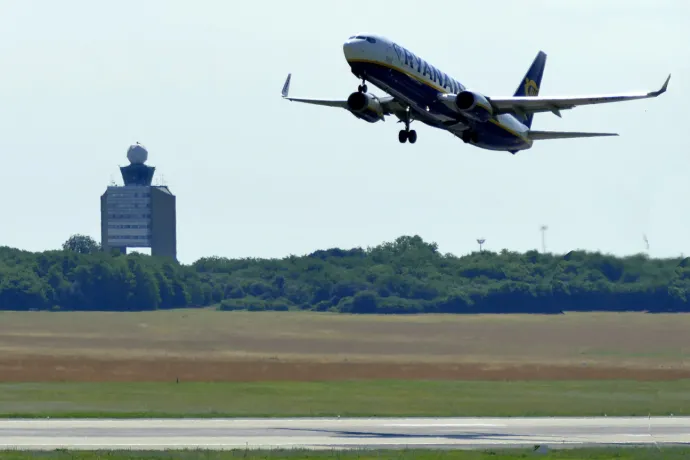
It was at the end of May that Hungarian PM Orbán announced the introduction of windfall taxes mandating that banks, insurers, wholesalers, energy providers and retailers, as well as telecommunication companies and airlines pay a large part of their extra profits into two separate funds set up by the Hungarian government for the next 2 years: the income in one of the funds will be used to strengthen the military and the other one to secure energy prices.
According to the decree, airlines are to pay a tax on the number of passengers departing from Hungary, there is no obligation to pay the tax on transit passengers.
"This unjustified tax is more than misguided”
This Wednesday, Ryanair urged the Hungarian government to withdraw the extra profit tax on airlines, stating that in their opinion, the introduction of such a tax is “more than misguided”.
"This unjustified tax will have a detrimental effect on air transport (which has already suffered huge losses over the past two years), Hungarian tourism and the economy. This ill-timed and ill-considered tax, which inexplicably compares the loss-making airline industry to highly profitable oil and energy companies, has made Hungary immediately uncompetitive and less attractive to airlines and tourists,"
– the Irish low-cost airline said in its statement.
Jason McGuinness, Director of Commercial at Ryanair says the Orbán government's imposition of an extra profit tax on airlines is illogical and unfounded. "The Hungarian government wants to impose a tax on an extra profit which does not exist in the sector due to the coronavirus epidemic and the Russian-Ukrainian war," – Ryanair's statement said.
A letter to passengers
On Thursday, affected Ryanair passengers received a letter from the airline stating that the tax referred to by the government as “extra profit tax” has been designated as “air traffic tax”, and will be charged to the passengers in the value of 3900 Forints – and is also applicable to bookings made before the tax was levied.
The information note reads: 'On 4 June 2022, Hungary introduced a new air passenger tax for passengers on flights departing from Hungary on or after 1 July 2022. This means that even if a reservation was made before 4 June but the flight departs from Hungary on or after 1 July, this new tax will be payable to the Hungarian Government."
The new tax is HUF 3,900 (about €10) per passenger if passengers are traveling to the European Union or to Albania, Andorra, Bosnia and Herzegovina, Northern Macedonia, Iceland, Kosovo, Liechtenstein, Moldova, Monaco, Montenegro, the United Kingdom, Norway, San Marino, Serbia, Switzerland, Ukraine or the United Kingdom and 9750 Forints if someone is traveling elsewhere. The extra cost is charged to the passenger's credit card. The airline adds that passengers who do not wish to accept this tax can cancel their booking and will receive a full refund. Cancellations must be made by 16 June 2022 at the latest.
The strongest possible terms
Minister for Economic Development Márton Nagy recently promised that the government would keep a close eye on whether companies affected by the extra profit tax were passing the burden on to consumers, and promised swift and tough action if this should happen.
On Friday, Nagy issued a statement in reaction to the letter sent out by Ryanair saying that "The government considers it unacceptable and in the strongest possible terms rejects Ryanair passing on the extra profit tax levied on airlines to the passengers."
In his statement sent to MTI (the National News Agency) Nagy reminds that “the government has made it clear to all those affected that they would be monitoring the market and would do everything necessary to prevent the special taxes from being passed on to the public." He also wrote that the government has signaled in advance that it would carry out a thorough investigation in such cases, and would take strong action against such a harmful practice.
“It is especially preposterous that Ryanair has already initiated this practice for tickets which have already been sold.”
Márton Nagy has therefore initiated a consumer protection investigation. He wants government agencies to thoroughly investigate and, if possible, prevent unfair practices by the airline.
The minister also requested that the authorities examine Ryanair's ticket pricing practices to ensure that they are in line with all European standards and requirements, especially given that, according to Nagy, such a tax on airlines has been in place in many European countries for a long time.
"The government expects all companies to pay the extra profit tax, and not to pass it on to the population, because the price of war should not be paid by Hungarian families"
– the Minister for Economic Development said.
A few minutes after the statement from Nagy was published on Friday, the Metropolitan Government Office has already announced that it has launched an immediate consumer protection procedure against Ryanair. The government agency is investigating whether the airline is engaging in unfair commercial practices in breach of consumer protection laws.
“We are not wimpy”
In his Friday-morning interview, Viktor Orbán confirmed that the affected companies must not pass the extra profit tax onto the population. Orbán said that he expects that apart from a few small blips, this will not be an issue:
“We are not some wimpy government which just stands by and does nothing – we take action against such things. This is exactly why they are protesting the introduction of these taxes” – he said.
For more quick, accurate and impartial news from and about Hungary, make sure to subscribe to the Telex English newsletter!
The translation of this article was made possible by our cooperation with the Heinrich Böll Foundation.